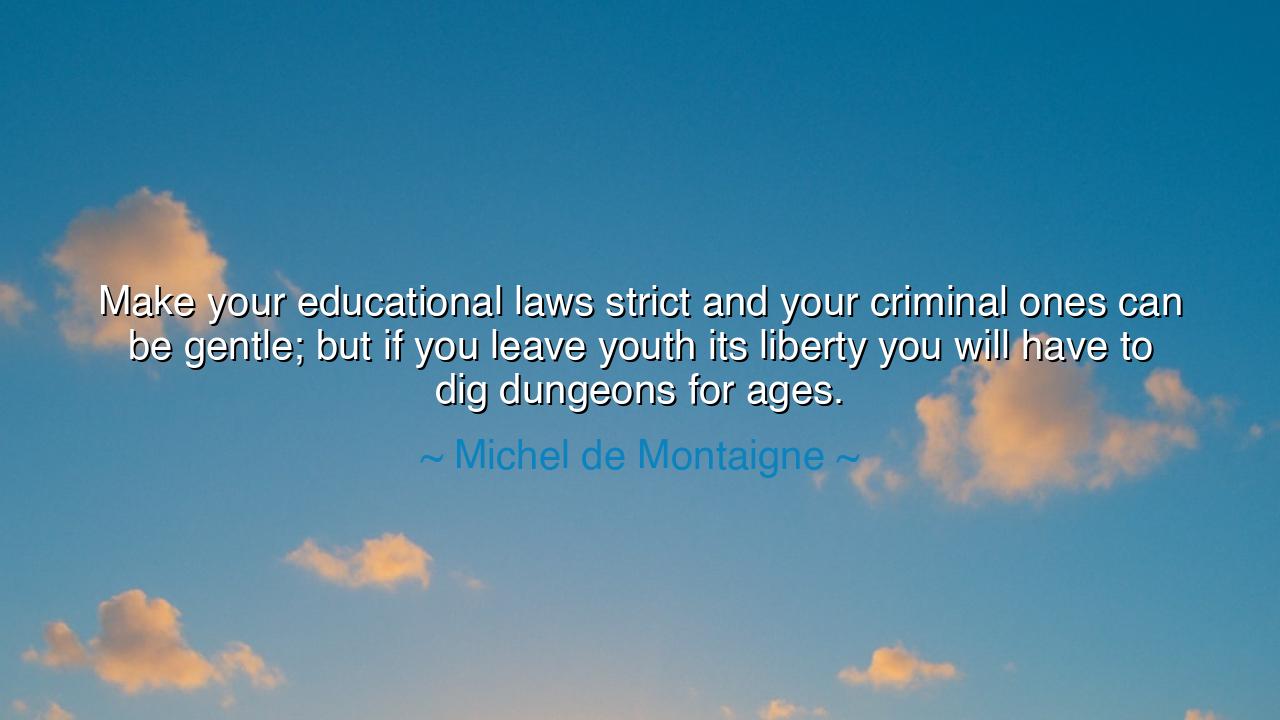
Make your educational laws strict and your criminal ones can be
Make your educational laws strict and your criminal ones can be gentle; but if you leave youth its liberty you will have to dig dungeons for ages.






Hear the grave wisdom of Michel de Montaigne, philosopher of the Renaissance, who declared: “Make your educational laws strict and your criminal ones can be gentle; but if you leave youth its liberty you will have to dig dungeons for ages.” This saying is not a call to harshness, but a plea for foresight. Montaigne, who pondered deeply the ways of men, saw that the roots of crime and vice lie in the soil of neglected education. To guide the young with firmness is to build a society where justice may be merciful. To abandon them to ignorance and impulse is to condemn generations to chains, prisons, and endless suffering.
The meaning of this saying lies in the recognition that youth is pliable, like clay before it hardens. If shaped by discipline, knowledge, and virtue, it takes the form of strength and nobility. But if left without guidance, it hardens into selfishness, violence, and corruption. Montaigne warns that the state which spares effort in education must spend endlessly in punishment. Better to invest in the forming of minds than in the building of dungeons. Better to guide children in the path of wisdom than to hunt men as criminals.
History itself provides proof of this truth. In Sparta, children were raised under strict educational laws, taught discipline, endurance, and loyalty from their earliest years. While their methods were severe and sometimes cruel, the result was a society where crime was rare and order was maintained without vast prisons. Contrast this with societies that neglected education, where ignorance bred lawlessness, and rulers were forced to build vast systems of punishment to contain their people. Montaigne’s wisdom is confirmed: strictness in education brings gentleness in law.
Consider also the example of the Industrial Revolution in Britain. In the early years, youth labored in factories and mines, denied the blessings of schooling. Ignorance and desperation spread like a plague, and with them came crime, drunkenness, and disorder. Prisons overflowed, and punishments grew harsh. It was only when reforms introduced compulsory education for children that the tide began to turn. Knowledge, discipline, and opportunity transformed the nation, reducing crime and lifting millions from despair. The dungeon was traded for the schoolhouse, and the result was renewal.
Montaigne’s words also carry a deeper moral lesson: that liberty without guidance is not true freedom, but a trap. To allow children to grow without direction is to let them become slaves to appetite and impulse. True freedom arises when the mind is trained, the character shaped, and the will disciplined. Only then can liberty be used wisely. Without such preparation, liberty becomes license, and license becomes ruin. Thus, the strictness of educational laws is not tyranny but a safeguard, a gift to future generations.
The lesson for us is clear: if we would have a merciful and just society, we must begin with the education of the young. Let schools be places not only of knowledge but of virtue. Let discipline be firm but fair, shaping minds to honor truth, justice, and compassion. For every hour invested in the guidance of youth saves countless hours of punishment in later years. To neglect this is to condemn society to an endless cycle of crime and retribution, the digging of dungeons without end.
Therefore, let each one take action: as parents, teach your children wisdom and self-control; as citizens, support laws that strengthen education and protect it from neglect; as leaders, remember that the gentleness of future laws depends upon the firmness of present schooling. For Montaigne’s words are not the echo of the past alone—they are a prophecy for every age.
So remember this saying: “Make your educational laws strict and your criminal ones can be gentle.” Let it remind you that the truest investment a society can make is not in weapons or prisons, but in the minds and hearts of its children. For if we sow knowledge and virtue in the garden of youth, we shall reap peace and justice in the harvest of ages. But if we abandon them, we shall dig dungeons until the end of time.






AAdministratorAdministrator
Welcome, honored guests. Please leave a comment, we will respond soon